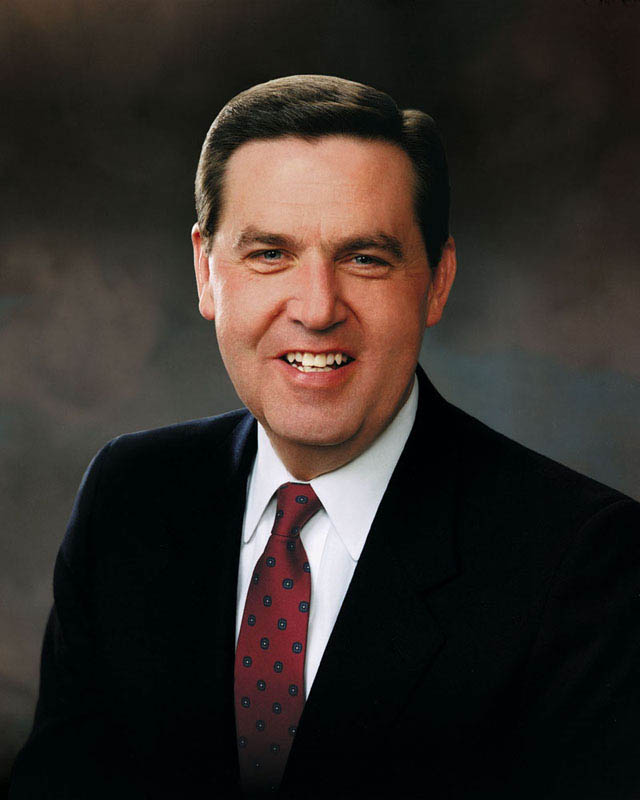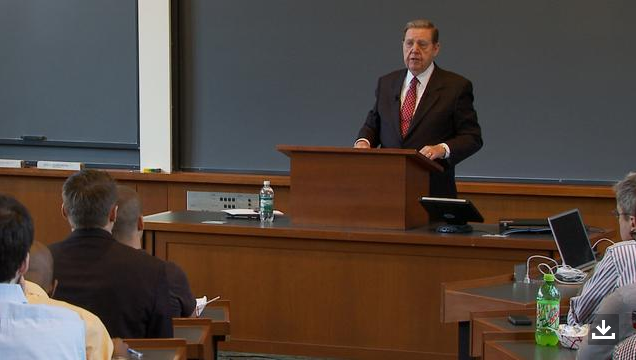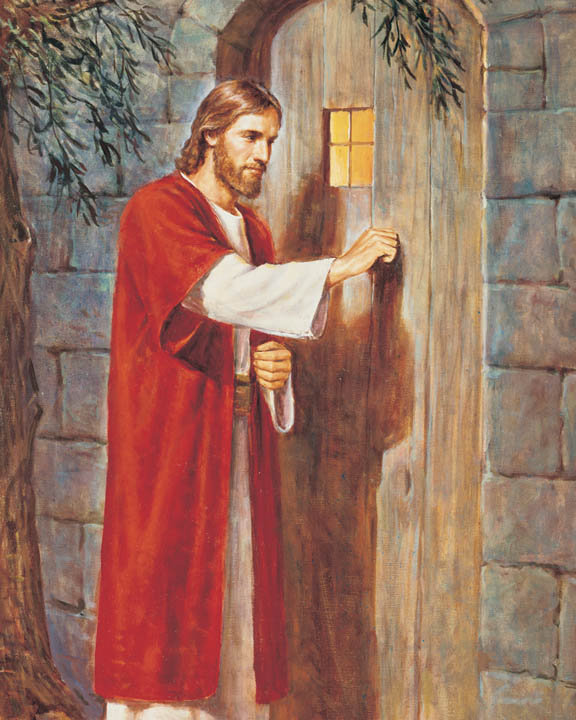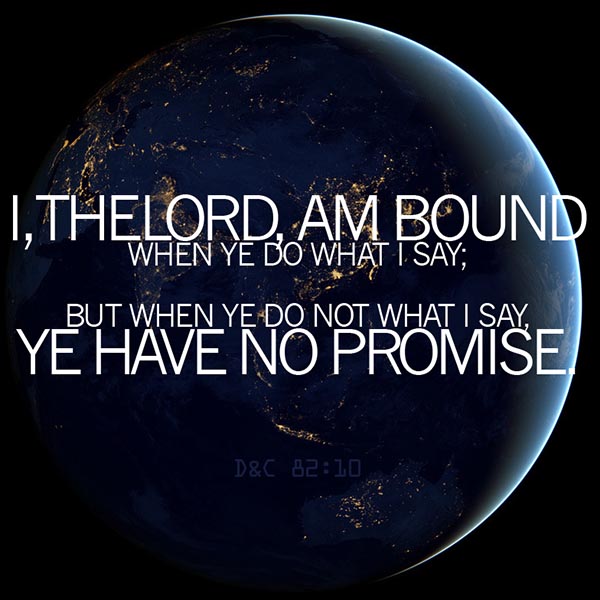 On Tuesday, March 20, 2012, Elder Jeffrey R. Holland addressed a group of Harvard Law students in a Mormonism 101 series sponsored by the school’s Latter-day Saint Student Association. Elder Holland is an apostle for The Church of Jesus Christ of Latter-day Saints (which church is frequently misnamed the Mormon Church). As a sustained apostle of the LDS Church, Elder Holland is seen as a prophet, seer, and revelator. Most of his address focused on beliefs which set Latter-day Saints apart from other Christian denominations, though he also talked a little bit about the similarities among differing Christian sects as well. He also talked to the attending students about restoration versus reformation in relation to the gospel of Jesus Christ.
On Tuesday, March 20, 2012, Elder Jeffrey R. Holland addressed a group of Harvard Law students in a Mormonism 101 series sponsored by the school’s Latter-day Saint Student Association. Elder Holland is an apostle for The Church of Jesus Christ of Latter-day Saints (which church is frequently misnamed the Mormon Church). As a sustained apostle of the LDS Church, Elder Holland is seen as a prophet, seer, and revelator. Most of his address focused on beliefs which set Latter-day Saints apart from other Christian denominations, though he also talked a little bit about the similarities among differing Christian sects as well. He also talked to the attending students about restoration versus reformation in relation to the gospel of Jesus Christ.
Following Elder Holland’s address, he held a question-and-answer session with visiting students. Some of the topics he touched on, in response to their questions, are below.
When asked what the point of departure of the Latter-day Saint (“Mormon”) faith is from other Christian denominations in regard to the doctrine of the Trinity, Elder Holland acknowledged that Latter-day Saints have done a disservice to themselves by focusing on the differing parts of this doctrine. While the difference is a large one (Latter-day Saints believe God, Jesus Christ, and the Holy Ghost are three separate and distinct beings while other Christian denominations believe the Trinity is an unknowable combination of the three beings), Elder Holland wished to state that in every other respect, Latter-day Saints view these beings as one in purpose and in practically every other aspect, other than their physical identity. Because Latter-day Saints have focused so much on the difference here, this is what has lingered in the public mind.
When a student asked about the American nature of The Church of Jesus Christ of Latter-day Saints, Elder Holland acknowledged that the social context for the origins of the restored church in the 1820s certainly held significance and consequence for the beginnings of the young church when it was restored by Joseph Smith in 1830. Elder Holland stated, “We don’t know anywhere else in the world that a concept of religious freedom would have existed to allow this to happen [a new religion to be organized which was so different from mainstream religions at the time] in 1820. In terms of timing, I don’t know anywhere else in my limited study of world history, where we could have had this religious opportunity, except in America at this time. I don’t think it could have gotten off the ground in any other climate.” He also pointed out, though, that in the past century, The Church of Jesus Christ of Latter-day Saints (“Mormon Church”) has become far more global, now with a larger membership and larger growth outside of the United States than inside it, in 140 countries.
 Elder Holland was sensitive in his response to the question asked about Latter-day Saints believing they had the only true church. He pointed out that “the issue comes down not to the lack of Christian teaching, not to the lack of compassion and mercy and Christian characteristics, but when it comes down to the ordinances, we believe there has to be some kind of documentable identification and line to that authority to perform that ordinance. That is not a statement about churches not doing good and not having great truth, but when it comes to the sacrament, when it comes the ordinance, we do press this matter of authority; somebody somewhere has to say I have authority to do this. It’s an issue about priesthood authority, not about doing good.”
Elder Holland was sensitive in his response to the question asked about Latter-day Saints believing they had the only true church. He pointed out that “the issue comes down not to the lack of Christian teaching, not to the lack of compassion and mercy and Christian characteristics, but when it comes down to the ordinances, we believe there has to be some kind of documentable identification and line to that authority to perform that ordinance. That is not a statement about churches not doing good and not having great truth, but when it comes to the sacrament, when it comes the ordinance, we do press this matter of authority; somebody somewhere has to say I have authority to do this. It’s an issue about priesthood authority, not about doing good.”
Connected to that topic and question is another question about the Mormon stance on spiritual manifestations in other faiths. Elder Holland stated that Latter-day Saints believe that throughout time there have been threads of truth everywhere and a variety of spiritual manifestations and experiences. While priesthood authority has been essential for restoration in any period (see the Old Testament, for example), there have always been times when heavenly manifestations were given to faithful people. These experiences are certainly not trivialized or discounted by Latter-day Saints.
The issue of equality of the sexes has been a major issue in our society. When asked about the Mormon doctrine on women and on their relation to men, Elder Holland boldly asserted that “the LDS Church believes that the creation of a woman was the crowning and final and most glorified moment of human creation.” He went on to say that the creation began with light and dark, and with Adam, it still wasn’t good enough. Though women do not hold the priesthood in The Church of Jesus Christ of Latter-day Saints, this is not seen as withholding any blessings from them, nor is it a reflection of their worth. Priesthood power is simply the responsibility of men while on this earth. Women are given other responsibilities and talents, which are in no way inferior to men’s. In fact, Elder Holland went on to point out, women lead many of the auxiliary organizations of The Church of Jesus Christ of Latter-day Saints and his wife was a leader in one of these organizations long before Elder Holland was asked to serve in his current capacity.
While it is true that not all people in the “Mormon Church” live this doctrine well, the doctrine itself is very clear on the worth and value of women. They are daughters of God who had divine attributes and responsibilities. Elder Holland said, “We all need to do better to see that that dignity comes through.”
In regard to living prophets, Elder Holland shared that they are still called in the same way as they were in the Old Testament. They are called to fill a vacancy by the Spirit of God. As far as losing divine guidance because of mistakes or errors, Elder Holland said, “Let’s try to be generous about human service. Christ was the only perfect person who ever lived.” He went on to give the example of Moses. Though he made an error and was not permitted to enter the Promised Land, he was still a prophet, and still carries that title and those keys. Error does not remove prophets from prophetic capacity. Part of the gospel of Jesus Christ is to repent and correct mistakes. Recognize the humanity of those who have given real service. People have faults, but that doesn’t mean they are not called of God.
Another issue raised was that of the Mormon doctrine of the afterlife and the practice of temple work for the dead. Elder Holland gave a legal analogy to help the law students understand that all work done in the spirit of 1 Corinthians 15:29 is not binding. We do this work for our ancestors because we believe that God is no respecter of persons (Acts 10:34) and they cannot do these essential ordinances for themselves. When the work is done for them, it has no effect unless they accept these ordinances on their behalf.
The last issue the students had time to discuss with Elder Holland was about the Church’s stand on gay marriage. Elder Holland said, “We’ll take a stand on moral issues, but try to stay out of anything that is just political.” For members of The Church of Jesus Christ of Latter-day Saints, gay marriage is a moral issue because of the Mormon understanding of the eternal nature of families and God’s plan for His children. While many feel we should “sit down and shut up” about this issue, it is one that Church leaders feel is moral and that they must take a stand on, but this does not mean they wish to take the right away from people to express their love and devotion to whomever they wish. When it comes to changing laws and definitions of marriage, though, the Church has felt compelled to makes its will known. Church leaders have never told members how to vote, though, and have not spent any Church funds on any kind of campaign, though many individual members have chosen to do so on their own.
LDS News: Read Jeffrey R. Holland’s address to Harvard Law Students




